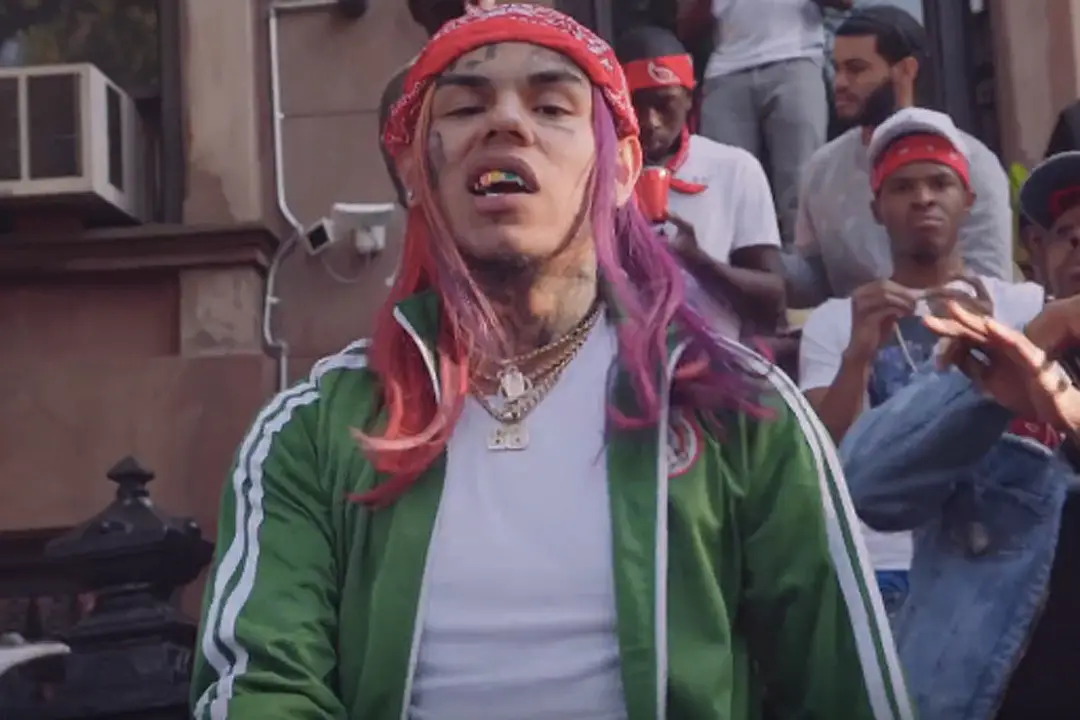The style of mumble rap, a sub-genre of hip hop distinguished by its users’ mumbling vocals and lack of articulation, is largely the product of a number of cultural influences, including an caricatured Southern drawl, consumption of lean — a codeine and soda combination that can slur speech — and the wearing of gold teeth, which can further impede pronunciation.
Although it’s a fairly recent development in the music world, mumble rap has risen to prominence through artists like Future, Lil Pump, 6ix9nine and XXXTentacion.
Even given its two-year long existence, the garbled genre is still a heavily debated and controversial offshoot from hip-hop proper. The most common discussion is whether or not it’s even good – respected rappers like Eminem have condemned the music and its participants as a whole.
Eminem’s comments — “Guess what I’ma never do / Show so much respect for you,” “You number one when it comes to slaughtered mics” — are not in completely poor taste. Indeed, the torchbearers of mumble rap have sporadically made headlines, but for reasons that are less than celebratory.
6ix9nine, a 22-year-old with nearly 180,000 Twitter followers, has been a household name for less than a year. His name is synonymous with two things — his hit song, “Gummo,” and the fact that he was arrested in 2015 for having sexual relations on video with a 13-year-old girl.
https://twitter.com/lala_fierceee/status/1017080415901843457
YoungBoy Never Broke Again, otherwise known as NBA YoungBoy, was arrested in February for an assault and kidnapping related to a domestic violence incident with his girlfriend at the time. Days later, a video surfaced online of YoungBoy violently abusing the victim. The 18-year-old still has 937,000 followers on Twitter and almost 6 million monthly listeners on Spotify.
Perhaps one of the most famous participants of mumble rap is XXXTentacion. Despite his untimely murder last month, “X” was also known for severely abusing and kidnapping his pregnant girlfriend. The details of his violence are incredibly gory and unsettling, yet the victim ultimately dropped charges and X never went to trial.
Lady Gaga is in the industry for 10 years now and not once she has asked anyone to pay her to take a selfie with or never she ever started drama while xxxtentacion was not in the industry for even 5 years and he has beaten a pregnant woman & a person for being gay.
— d (@gagashymn) July 7, 2018
The rappers coming up in the so-called mumble rap game have gained more notoriety for their serious legal issues than their music. Because of that, the narratives of rape culture and mumble rap have slowly begun to intertwine.
Rape culture encompasses a wide variety of manipulative crimes including assault, coercion and molestation. The concept draws heavily on the idea that rape (or sexual and violent crimes) can become normalized all because of societal attitudes.
Even with severe legal problems hanging over their heads, most of these rappers are still able to build empires for themselves. Despite these rappers’ criminal convictions, their crimes seem to barely harm their reputations. What’s more, depending on whom you talk to, the accusations might actually improve their credibility in the hip-hop game.
This is not the first time that hip-hop has been linked to violence or crime. When N.W.A first surfaced in the late 1980s, conventional folks were terrified.
Although their lyrics, which vilified the police and encouraged violent resistance, were actually pretty well-warranted, the group welcomed the controversy and its attendant fame.
To be clear, regardless of what a particular musician does for the music world, if they commit a sex crime, their artistry shouldn’t exclude them from the consequences. This point extends beyond hip-hop. In 2017, Ethan Kath, of electronic group Crystal Castles, was accused of raping co-founder Alice Glass. Glass then left the duo while Kath remained and replaced her.
But as hip-hop matured, rappers were able to move away from these stereotypes. In the 1990s, The Notorious B.I.G. was preaching, “I don’t wanna rape ya / I just want the paper.” In 2017, Lil Baby rapped, “If she won’t fuck, I won’t make her.”
Yet mumble rap, a fairly young subgenre with even younger artists, is slowly setting those stereotypes back in place. XXXTentacion notoriously rapped, “I took a white bitch to Starbucks / That little bitch got her throat fucked,” while Trippie Redd said, “If she hit my jack, I hit her right back.”
Regardless of whether or not mumble rap is even good, the artists with sexual misconduct accusations attached to their reputations continue to rise. Radio stations still play their music, and people still take them seriously.
In short, by continuing to support these musicians, the world is essentially pardoning their wrongful actions. This is what rape culture is all about: Because people enjoy 6ix9nine’s music, for example, the fact that he had sex with a minor is suddenly a mute factor. It no longer matters.
Let’s be blunt. Abusers in the mumble rap game don’t, under any circumstances, deserve support. The fault at hand lies equally on both the artists and their fan bases. However, because someone like Trippie Redd clearly doesn’t understand the unlawfulness of assaulting a woman, the solution weighs heavier on the consumer.
There’s nothing wrong with liking mumble rap. If that happens to be your music taste, then by all means, continue supporting that scene. What matters is ending your support for any abusers in the game.
It’s not terribly hard to do that, but convincing enough people to do so is a bigger challenge. Making a proper dent in a person’s career is not impossible. It consists of unfollowing them and no longer listening to their music.
https://twitter.com/ChristianJC98/status/1016077531886313472
Better yet, spreading the word of what they’ve done and why it’s so wrong is an even more productive form of challenging their so-called artistry.
By claiming that their talent is more important than the fact that they assaulted someone is only perpetuating rape culture. It gives room for more musicians to rise in the scene and do the exact same thing.
The perfect time to make a change is now. The mumble rap genre doesn’t have to be completely tainted. Speaking up and making a difference in which musicians receive support and fame can alter the rape culture narrative.
As consumers, it’s up to the listeners to decide who gets the spotlight. Don’t let abusers get in the way of that.

















